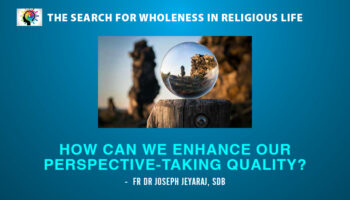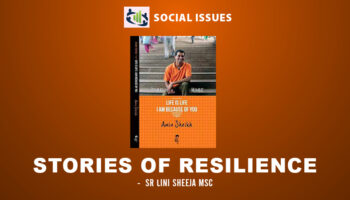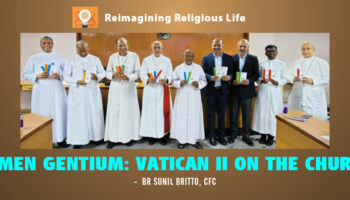TOGETHER FOR A BETTER WORLD
The United Nations observes designated days to promote international awareness and action on issues vital to humanity. Most of these “UN Days” have been established by resolutions of the UN General Assembly. Schools and other institutions are in a good position to observe these Special Days meaningfully and thus increase the awareness about crucial issues.
Here we present you briefly just two special days for each month of the year. There are other special days, too, which we could not include, for lack of space. More information is found on the Internet.
January 1: World Peace Day
The Catholic Church keeps January 1st as the World Day of Peace. Introduced in 1967, Pope Paul VI wanted that it be celebrated as a hope and as a promise at the beginning of the calendar. On this day, the UN Peace Bell is rung at the UN headquarters in New York. International Peace Day on 21 September was established in 1981.
January 31: Street Children’s Day
India has the largest number of street children in the world. A street child, in the strict sense, is someone “for whom the street has become his or her habitual abode and/or source of livelihood.” The purpose of the Day is to draw attention to the problems of this most vulnerable category among children.
February 20: World Day of Social Justice
The pursuit of “social justice for all” is at the core of UN’s global mission to promote development and human dignity. This Day aims at garnering global support to eradicate poverty, promote full employment, gender equity and access to social well-being and justice for all.
February 21: International Mother Language Day
There are some 7,000 known languages alive in the world today. This Day aims at promoting the preservation and protection of all languages. It is also to encourage linguistic diversity and people’s awareness of linguistic and cultural traditions and to inspire solidarity, tolerance and dialogue.
March 8: International Women’s Day
This Day is observed to promote the just and respectful treatment of women in society, and to strive for gender parity in many areas where discrimination still exists, e.g., in payment.
March 22: World Water Day
Though 71 percent of the earth’s surface is covered with water, fresh water remains a scarce commodity. No wonder someone has said the wars of the twenty-first century will be fought over water. This Day focuses attention on the sustainable management of water resources.
April 22: International Mother Earth Day
The Earth and its ecosystems are our home. The Day draws attention to the interdependence among human beings, other living species and the planet we all inhabit. It also focuses on the damage done by overexploitation of natural resources and the need for sustainable development.
April 25: World Malaria Day
Globally, 3.3 billion people in over 100 countries are at risk of malaria and half a million die of it every year. World Malaria Day was established in 2007 to provide understanding of malaria and national malaria-control strategies, including community-based activities for malaria prevention and treatment.
May – First Sunday: World Laughter Day
Laughter is, as everybody knows, the best medicine. Psychologist William James has said, “We don’t laugh because we’re happy; we’re happy because we laugh.” Some studies show laughter may boost our immune system, relieve tension and help us relax. One needn’t wait till May to start taking this medicine!
May 15: International Day of Families
“Families are in crisis!” The family is the nucleus of civilization and the basic social unit of society. Stronger families, stronger societies. This Day promotes awareness of issues relating to families.
June 5: World Environment Day:
It is a day for encouraging worldwide action for our environment. It raises our awareness on environmental issues like pollution, global warming, sustainable consumption, depletion of the ozone layer, toxic chemicals, and wildlife crime.
June 14: World Blood Donor Day
This Day, established in 2004, serves to raise awareness of the need for safe blood and blood products, and to thank blood donors for their voluntary, life-saving gifts of blood. Blood cannot yet be manufactured artificially; so voluntary blood donation remains vital for healthcare worldwide.
July 30: International Friendship Day
In 2011 the UN proclaimed the International Day of Friendship with the idea that friendship between peoples, countries, and cultures can inspire peace efforts and build bridges between communities. On this day, the UN wishes to involve young people, as future leaders, in community activities that include different cultures to promote international understanding and respect for diversity.
July 30: World Day against Trafficking in Persons
Every country in the world is affected by human trafficking, whether as a country of origin, transit, or destination for victims. Women and children make up the majority of the victims. This Day focuses on the situation of victims of human trafficking and the promotion and protection of their rights.
August 9: International Day of Indigenous Peoples
There are an estimated 370 million indigenous people in the world. They make up less than 5 per cent of the world’s population, but account for 15 per cent of the poorest. “Indigenous peoples” is a generic term which includes tribes, aboriginals, ethnic groups, adivasis, nomads, hill people, etc. They are often powerless and neglected.
August 12: International Youth Day
Established in 2000, the Youth Day focuses on the aspirations of the young for a better society and how best to help them to reach their full potential. It reaffirms their right to quality education, health care and other basic services and promotes their active involvement in maintaining peace and harmony in the world.
September 8: International Literacy Day
The Day highlights the extraordinary value of literacy in the life of individuals, societies and nations. Globally one among five men and two out of every three women are illiterate. India, despite its economic growth, still remains the country with the largest number of illiterate adults in the world.
September 26: International Day for the Total Elimination of Nuclear Weapons
Established in 2013 by the UN, the Day asks the world community to reaffirm its commitment to global nuclear disarmament and to educate the public—and the leaders— about the threat posed by nuclear weapons and the need for their total elimination.
October 2: International Day of Non-Violence
In 2007, the UN declared October 2 as the International Day of Non-Violence in honour of Mahatma Gandhi. Purpose: to spread non-violence through education and public awareness.
October 11: International Day of the Girl Child
This Day promotes girls’ rights and highlights gender inequalities between girls and boys. It is an opportunity to raise public awareness of the different types of abuse and discrimination that many girls around the world suffer from. In India, the National Girl Child Day is celebrated on 24 January.
November 13: World Kindness Day
Aim: to highlight the importance of kindness, especially random acts of kindness. The idea is to be generous in thoughts and actions with the goal of collectively becoming more human. Research shows that doing acts of kindness makes one happier and people who are happy tend to be kinder.
November – Third Sunday: Road Traffic Victims Day
Each year, millions die on the roads and many more are injured. In India, over 150,000 are killed in road accidents every year—more than in all our wars put together. The Day highlights the importance of safe driving.
December 5: World Soil Day
Soil is a finite natural resource. There has been a worldwide degradation of soil resources. While 95 percent of our food comes from soil, soil scientists are raising an alarm—33 percent of our soils are already degraded! Hence the need for effective action.
December 10: Human Rights Day
The Universal Declaration of Human Rights proclaims the inalienable rights which everyone is inherently entitled to as a human being—regardless of race, colour, religion, sex, language, etc. It establishes the equal dignity and worth of every person.

To subscribe to the magazine Contact Us





